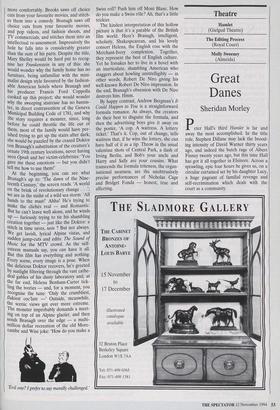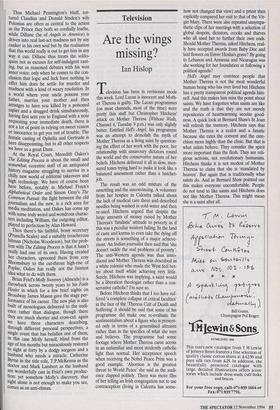Theatre
Hamlet (Gielgud Theatre) The Editing Process (Royal Court) Molly Sweeney (Almeida)
Great Danes
Sheridan Morley
Peter Hall's third Hamlet is far and away the most accomplished. In the title role, Stephen Dillane may lack the brood- ing intensity of David Warner thirty years ago, and indeed the butch rage of Albert Finney twenty years ago, but this time Hall has got it all together in Elsinore. Across a sprawling, epic four hours he gives us, on a circular curtained set by his daughter Lucy, a huge pageant of familial revenge and self-recrimination which deals with the court as a community. Thus Michael Pennington's bluff, tor- tured Claudius and Donald Sinden's wily Polonius are often as central to the action as the Prince they both so cordially loathe, while Dillane (he of Angels in America) is driven into real last-act madness not by any canker in his own soul but by the realisation that this world really is out to get him in any way it can. Dillane thus treats the solilo- quies not as excuses for self-indulgent rant- ing, but as reasoned debates with his won inner voice: only when he comes to the con- clusion that logic and luck have nothing to offer him does he settle for murder and madness with a kind of weary resolution. In a world where your uncle poisons your father, marries your mother and then arranges to have you killed by a poisoned rapier and a drugged drink simultaneously, having first sent you to England with a note requesting your immediate death, there is not a lot of point in relying on sweet reason or innocence to get you out of trouble. The female casting of Ophelia and Gertrude is here disappointing, but in all other respects we have us a great Dane. At the Royal Court, Meredith Oakes's The Editing Process is about the small and somewhat eccentric staff of an antiquated history magazine struggling to survive in a Chilly new world of editorial takeovers and high technology. We have of course been here before, notably in Michael Frayn's Alphabetical Order and Simon Gray's The Common Pursuit: the fight between the old Journalism and the new, is a rich area for media meditation, and Oakes has come up with some truly weird and wondrous charac- ters including William, the outgoing editor, played to perfection by Alan Howard. Then there's his faithful, bossy secretary (Prunella Scales) and a suitably treacherous pitman (Nicholas Woodeson), but the prob- lem with The Editing Process is that it hasn't really had one of its own. Having created her characters, uprooted them from cosy Bloomsbury to the cut-throat high-rise of Poplar, Oakes has really not the faintest idea what to do with them.
Brian Friel's Molly Sweeney (Almeida) is a throwback across twenty years to his Faith Healer in which for a few brief nights on Broadway James Mason gave the stage per- formance of his career. The new play is also built of monologues delivered to the audi- ence rather than dialogue, though there they are much shorter and cross-cut. again we have three characters describing, through different personal perspectives, a single event that has befallen one of them, in this case Molly herself, blind from the age of ten months but miraculously restored to sight at forty by a dodgy surgeon and a husband who needs a miracle. Catherine Byrne in the title role, T.P.McKenna as the doctor and Mark Lambert as the husband are wonderfully cast in Friel's own produc- tion: yet somehow Molly's discovery, that sight alone is not enough to make you see, comes as an anti-climax.



































































 Previous page
Previous page